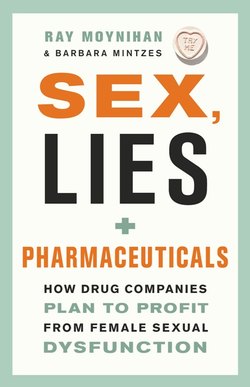Читать книгу Sex, Lies, and Pharmaceuticals - Ray Moynihan - Страница 8
На сайте Литреса книга снята с продажи.
ОглавлениеAuthor’s note
Sex seems to be how most of us got here, apart from the odd case of an immaculate conception or a miracle of medical technology. Sex is also something that—just like the weather— most of us are interested in, more or less. But just so you’re under no illusions, while this book is certainly about sex, it’s also an exposé of how medical science is imperceptibly merging with pharmaceutical marketing.
As a disclosure front and centre, for more than a decade I’ve been writing about the tangled web of relationships between doctors and drug companies, and the unhealthy impacts of that entanglement on people and public health systems. My coauthored 2005 book describing that problem, Selling Sickness: How drug companies are turning us all into patients, laid out ten case studies of disease-mongering: the process of widening the boundaries of illness in order to sell people more treatments. With humility and surprise, I can report that Selling Sickness has since been translated into twelve languages, and reprinted a number of times in North America and elsewhere.
In Sex, Lies and Pharmaceuticals the making of a single modern medical condition is forensically examined, and the resulting story is both fascinating and frightening. The book’s methods are those of rigorous investigative journalism, targeted at uncovering what happens behind the scenes of contemporary medical science. It draws on many scientific journal articles, medical textbooks, historic works of philosophy and sexuality, as well as some juicy corporate marketing materials and a few very revealing court documents.
I have also interviewed a long list of the key players in the emerging field called ‘sexual medicine’, spoken to professors, psychologists, bloggers, doctors and drug company insiders, and attended scientific seminars and medical meetings all over the world. The facts and evidence have been checked meticulously, and an extensive notes section has been included at the end of the book. I should apologise in advance to those who may feel there’s too much detail at certain points, but for others this will be the lifeblood of the story. And if you do find a factual error, please let us know so we can correct it in future editions.
Almost everyone approached for an interview agreed to speak with me, and their comments have been invaluable, with many appearing in direct quotations. While a tiny handful declined— as is noted when necessary—every effort has been made to fairly represent their viewpoints, which are readily available through their many publications and presentations.
It is important to say very clearly here that the book does not accuse anyone of lying. The ‘lies’ in the title refers to the fictions that flow from pharmaceutical marketing—like the notion that one in ten women suffers from a disorder of low desire. As we’ll see, soon that disorder itself may no longer even exist. The corporate need to market drugs for discrete disease labels does not match well with uncertainty over how to understand and classify women’s sexual difficulties.
One practical note for the reader is that the terms ‘dysfunction’, ‘disorder’ and ‘disease’ are used regularly, sometimes interchangeably, as these are the words employed by drug companies and some doctors to describe many of the sexual problems women experience. Others involved in the debate about sex tend to use another set of words, like ‘difficulties’, ‘dissatisfactions’ or ‘discontent’, instead of the more medical language. Trying to define the difference between a difficulty and a dysfunction is an extremely challenging task and, as uncovered in the following pages, one that is generating a compelling global debate.
Most importantly, the book readily acknowledges that women’s sexual problems can sometimes be disabling, and proven therapies—including pills—may be extremely valuable for some people. Yet it also asks very directly how much discontent is being manufactured through the creation of new sexual norms, and how much dissatisfaction is being exploited for corporate gain.
Finally, Sex, Lies and Pharmaceuticals is offered by co-author Barbara Mintzes and me as an opportunity to join this global debate about the making of a new medical condition. It is part of a conversation, its ideas to be discussed with family and friends, criticised in book clubs and on blogs and debated at public meetings around the world. Please join in, and feel free to bring tomatoes, a copy of the book for signing, or both.
Ray Moynihan Byron Bay, June 2010 www.raymoynihan.net
